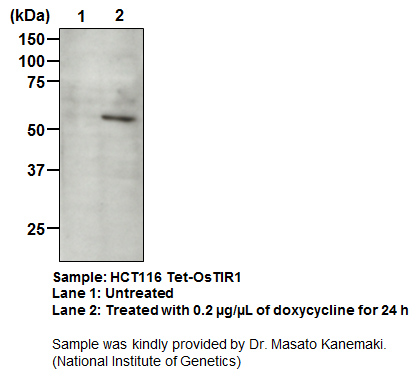- Japan(Japanese / English)
- Global
- MBL TOP
- MBL site search
Close
This site is for customers in Japan.
Customers in other regions, please go to Global page.
HOME >
Product search results > Code No. PD048
Anti-OsTIR1 pAb
Price
¥52,800
Availability (in Japan)
10 or more
(In Japan at 17:33,
Apr 26, 2024 in JST)
Size
100 µL
| Data | |||||
|---|---|---|---|---|---|
| Clonality | Polyclonal | Clone | Polyclonal | ||
| Isotype (Immunized Animal) | Rabbit IgG | ||||
| Applications |
|
||||
| Immunogen (Antigen) | Recombinant full-length Oryza sativa Transport inhibitor response 1 (OsTIR1) protein | ||||
| Reactivity [Gene ID] | Other (Oryza sativa) |
||||
| Storage buffer | PBS/50% glycerol, pH 7.2 | ||||
| Storage temp. | -20°C | Conjugate | Unlabeled | Manufacturer | MBL |
| Alternative names | Oryza sativa Transport inhibitor response 1 | ||||
| Background | The auxin-inducible degron (AID) system allows the rapid and reversible proteolysis of proteins of interest, which have been invented by Dr. Masato Kanemaki in National Institute of Genetics in Japan. OsTIR1 is a F-box family protein specifically expressed in a rice plant. Since OsTIR1 can function under a culture condition at 37 degree, it is integrated in the AID system to work it in mammalian cells. Briefly, OsTIR1 binds to endogenous Skp1 to form the Skp1-Cullin1-OsTIR1 complex (SCFTIR1). SCFTIR1 binds and ubiquitinates the AID tag in the presence of auxin, and promotes proteasome-dependent degradation of the AID-tagged target protein. Human HCT116 cell lines harboring OsTIR1 (CMV-OsTIR1 RCB4662 or Tet-OsTIR1) are available from the RIKEN Cell Bank. | ||||
| Related products | M214-3 Anti-mini-AID-tag mAb |
||||
| Citations |
Immunocytochemistry
|
||||
| References |
|
||||
| Product category |
|
||||
- The availability is based on the information in Japan at 17:33, Apr 26, 2024 in JST.
- The special price is shown in red color.
- Please note that products cannot be ordered from this website. To purchase the items listed in this website, please contact us or local distributers.
- Abbreviations for applications:
WB: Western Blotting, IH: Immunohistochemistry, IC: Immunocytochemistry, IP: Immunoprecipitation
FCM: Flow Cytometry, NT: Neutralization, IF: Immunofluorescence, RIP: RNP Immunoprecipitation
ChIP: Chromatin Immunoprecipitation, CoIP: Co-Immunoprecipitation
DB: Dot Blotting, NB: Northern Blotting, RNA FISH: RNA Fluorescence in situ hybridization - For applications and reactivity:
*: The use is reported in a research article (Not tested by MBL). Please check the data sheet for detailed information.
**: The use is reported from the licenser (Under evaluation or not tested by MBL).
- For storage temparature: RT: room temparature
- Please note that products in this website might be changed or discontinued without notification in advance for quality improvement.









 Citations
Citations Data Sheet
Data Sheet


